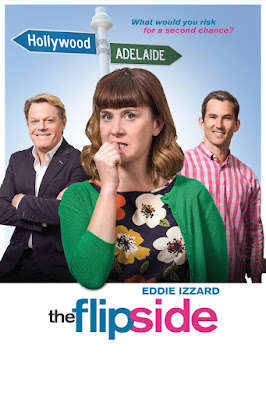 |
| Andrew Sarris, Molly Haskell |
The gloriously happy couple in the two screens above are, of course, Andrew Sarris and Molly Haskell recorded here by Criterion for its 2004 DVD of Lubitsch’s last masterpiece, Heaven Can Wait from 1943. This terrific interview along with both original and brand new supplemental material has been ported over to Criterion's new Blu-ray edition of the movie including a new 4K restoration from Fox..
The inclusion of the Sarris/Haskell “married couple” discussion is, surely beyond felicity for a movie which is ostensibly so grounded in the mystery, magic, the drama and tragedy of marriage. Yet for all that, the movie is most remarkable for two huge temporal elisions.
 |
| Don Ameche, Heaven Can Wait |
The first and biggest is a ten years' gap, a complete blank from the day Henry van Cleeve (Don Ameche) and his beloved Martha (Gene Tierney, in supernaturally flattering Technicolor) elope, to the day ten years later of their anniversary date, when she leaves him to return to her monstrous parents - Eugene Palette and Marjorie Main - in their lurid log brown toned “Xanadu” nightmare conception of bucolic rural America in possibly the American cinema’s ugliest decor.
 |
| Gene Tierney, Heaven Can Wait |
It’s no coincidence the screenwriter, Samson Raphaelson was also the author of Lubitsch’s four other greatest pictures: Trouble in Paradise (1932), The Merry Widow (1934), the Sternbergian-Pirandellian Angel (1936) and the sublime The Shop Around the Corner in 1940. For a screenplay that supposes the subject to be marriage, Heaven delivers itself over to Henry himself and an astonishingly sustained performance of a near impossible part by Don Ameche.
Henry, even as a 15 year old, here played by Dicky Moore with a kind of Dionysian luridness and a set of smarts manages to get an extra six bucks a week for the new French Maid whom he’s just seduced.
 |
| Don Ameche, Laird Cregar, Heaven Can Wait |
Henry is at turns a hypocrite, a lecher, a louse, self-deluding and a quasi- liar, but - thanks to Ameche and Raphaelson and Lubitschs’ incredibly personal investment in the character, he’s human. And ultimately, as he tells Satan himself – played by a leering Amber-tanned black-suited Laird Cregar, straight out of Murnau’s incarnation of Old Nick as played by Emil Jannings in the 1926 Faust, but now in a Deco-Moderne version of Hell out of Lube’s own 1932 Madame Colet's deco apartment in Trouble in Paradise, invented by Fox art Director James Basevi and photographed with all the opulence only Fox 40s Technicolor and Eddie Cronjager could deliver.
It’s no surprise Cronjager’s other big picture for Fox that year was Busby Berkeley’s hallucinatory The Gang’s All Here.
The costumes in this picture, hideous almost to a shot and character, were “created” by Rene Hubert and reach their apex of awfulness in the dowdy, dead leather and worn coal tones of the rich yokel Strabels. Color design even in the paradisiacal sequences from the van Cleeve household always threatens to run into something way beyond picture postcard, a mood which the movie sets up initially for the recollected memories and then keeps intentionally losing throughout the narrative.
Lubitsch sometimes pulls the color back, and in the most lyrical example (see screen above) he drags it right into a replica of pre 1933 two Color process Technicolor which could only reproduce red and a kind of blue-green. The sequence is the “Sheik of Araby” performance Henry and Martha attend at the Ziegfeld Follies just before the final sequences of the picture. As critic and Lubitsch scholar Joe McBride notes in his new biography of Lube, the show could well signal a call to one of Lube’s own 1920s “history” movies with all its show biz hokum and “exotica”. The payoff is Henry’s penultimate opportunity for infidelity, prompted by yet another blonde showgirl, played with fierce but endearing toughness by Helene Reynolds.
 |
| Ernst Lubitsch |
It’s not only the smart showgirl who determines the final parameters of this playboy’s life. Martha herself in two major dialogue scenes, both supposedly reconciling, reveals at every turn of the dialogue she’s at least three steps ahead of Henry and has been for the duration. And so will it be for her last great scene, sweetly, shortly before she dies.
 |
| Samson Raphaelson |
What matters to these two, as Lubitsch and Raphaelson clearly express, is also what matters to Gaston and Lily in Trouble in Paradise. And to “Angel” and Sir Frederick in Angel, and Danilo and Sonia in The Merry Widow- they are both innate rebels, they both crave to escape bourgeois rectitude and break out. They are sexually intoxicated by each other, often as much fetishistically by their mutual transgressions. And they can’t live without each other.
 |
| Schawn Beltston |
Just a few words on the new 4K. The work comes from Fox’ technical team under Archival maestro Schawn Beltston. It's almost impossible to believe something so beautiful could have been achieved with not a single first generation element. The restorers were obliged to reconstitute new separations and a working dupe negative from a CRI interneg which is possibly the worst imaginable situation from which a restorer can work. As we doubtless all know, Fox junked all its nitrate negs, including all the nitrate Technicolor three strips sometime after 1977 in some kind of insane economy measure. Quite frankly what Beltston and his team can achieve these days on titles like this and the amazing Leave her to Heaven is something only prayers could answer.





























